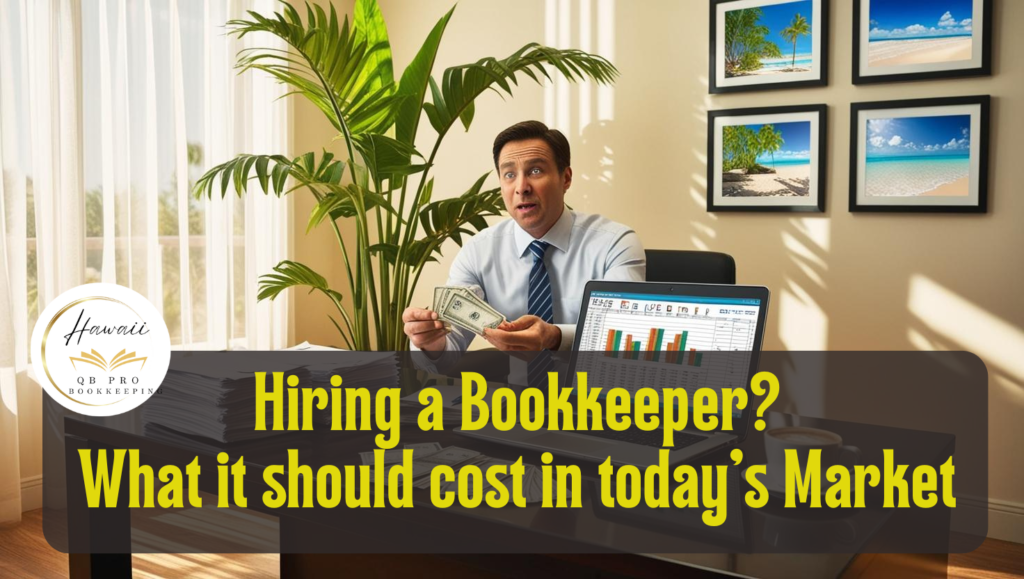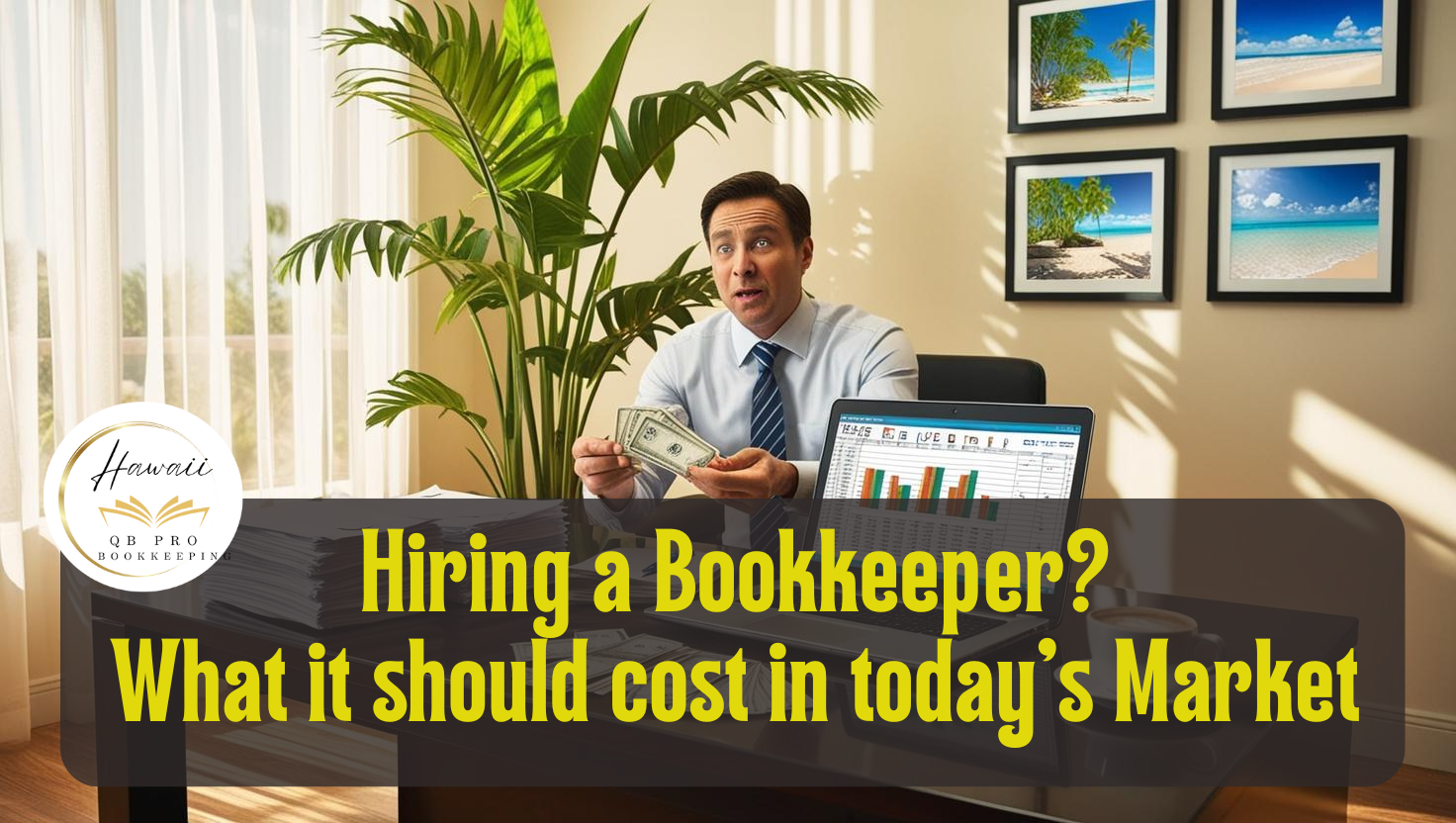Hiring a Bookkeeper? What Should a Bookkeeper Cost in a High-End Market?

Hiring a bookkeeper in Hawaii depends on their experience and your business needs. Flat monthly fees generally range from $300 to $3,000 a month, influenced by the complexity of your financial situation. Make sure to contemplate additional services like payroll or tax preparation, which can increase costs. It’s key to evaluate what services you’ll need. Keep exploring to discover more about budgeting and finding the right bookkeeper for you.
Understanding the Basics of Bookkeeping Costs in Hawaii
When you’re considering hiring a bookkeeper in Hawaii, it’s important to grasp the fundamental costs involved.
Typically, you’ll find rates ranging depending on their experience and expertise. Some bookkeepers might charge a flat monthly fee, often between $300 to $3,000, based on your business’s size and complexity. Normally most firms prefer a retainer model verse an hourly rate because there are many variables and situations that come up.
Remember, additional services like payroll or tax preparation might increase those costs. It’s vital to understand what’s included in their pricing to avoid any surprises.
Investing in a quality bookkeeper can save you time and stress while ensuring your finances are in good hands.
Factors Influencing Bookkeeping Fees
Several factors influence the fees you’ll encounter when hiring a bookkeeper in Hawaii.
First, the bookkeeper’s experience and qualifications can greatly impact costs; those with specialized skills or certifications often charge more.
The complexity of your financial situation matters too—more intricate accounts require additional time and expertise.
Furthermore, the volume of transactions you process each month can lead to varying fees, with higher volumes typically increasing costs.
Finally, whether you choose an independent bookkeeper or a larger firm can also affect your bottom line, as firm rates may include overhead expenses.
Keep these factors in mind to budget effectively.
Newer bookkeepers often charge on the lower end of that range, while those with specialized skills or extensive experience may command higher rates.
Additionally, you might pay more if your bookkeeping requires advanced knowledge of specific industries or software.
When evaluating rates, consider what tasks you’ll need help with and how frequently. This way, you can find a bookkeeper who fits within your budget while meeting your unique requirements.
Comparing Full-Service Bookkeeping vs. Part-Time Bookkeeping
While weighing your options for bookkeeping, understanding the differences between full-service and part-time bookkeeping is essential.
Full-service bookkeeping offers thorough support, handling everything from day-to-day transactions to tax preparation, ensuring you focus on your business. This type tends to be a long-term solution for busy entrepreneurs.
In contrast, part-time bookkeeping provides flexibility, allowing you to hire a bookkeeper only when needed. This option works well for smaller businesses with less complexity.
However, part-time services might lack the depth of full-service offerings, so you’ll need to assess your specific needs to determine which suits you best.
Budgeting for Bookkeeping Services in Your Business
When planning your budget for bookkeeping services, it’s essential to take into account your business’s unique needs and financial situation.
Start by evaluating the volume of transactions you process monthly; this helps determine whether you need full-time or part-time help.
Don’t forget to factor in additional costs like software subscriptions or training.
Research local rates to get an idea of what bookkeepers typically charge in Hawaii.
Finally, think about building a buffer for fluctuations in expenses.
Frequently Asked Questions
What Qualifications Should I Look for in a Bookkeeper?
When choosing a bookkeeper, look for relevant qualifications like a degree in accounting, certifications, and experience in your industry.
Their proficiency with accounting software and attention to detail will also guarantee your financials stay accurate.
How Do I Find a Bookkeeper in Hawaii?
To find a bookkeeper in Hawaii, start by asking for recommendations from local businesses or friends. Hawaii QB Bookkeeping has a friendly, experienced staff that can fit most budgets of small businesses.
Online platforms can help you browse profiles, read reviews, and compare qualifications to guarantee you choose the right fit.
What Software Do Most Bookkeepers Use?
Most bookkeepers use software like QuickBooks, Xero, or FreshBooks.
You’ll find these programs streamline accounting tasks, making it easier for you to manage finances.
Each has unique features, so choose one that fits your needs best.
Can I Hire a Bookkeeper Remotely?
Yes, you can hire a bookkeeper remotely. Most issues can be handled if you have good internet and communication for video chat if needed.
Many businesses benefit from this flexibility, allowing you to find someone with the right expertise regardless of location.
Make certain they’re proficient with the software you use for seamless collaboration.
How Often Should I Meet With My Bookkeeper?
You should meet with your bookkeeper regularly, ideally once a month, to review your financials and discuss any issues. Any issues will need to be settled before your books can be reconciled for the month. So normally meetings or reports are after all the end-of-month deposit and statements are in.
Adjust the frequency based on your business needs and the complexity of your finances.
Conclusion
In conclusion, when hiring a bookkeeper in Hawaii, it’s crucial to understand the cost factors and your specific needs. Whether you opt for full-service or part-time bookkeeping, make sure to budget appropriately. By doing your research and knowing the typical rates, you can find a bookkeeper who fits your financial plans while maintaining the integrity of your business finances. Invest wisely, and you’ll ensure your books are in good hands!








